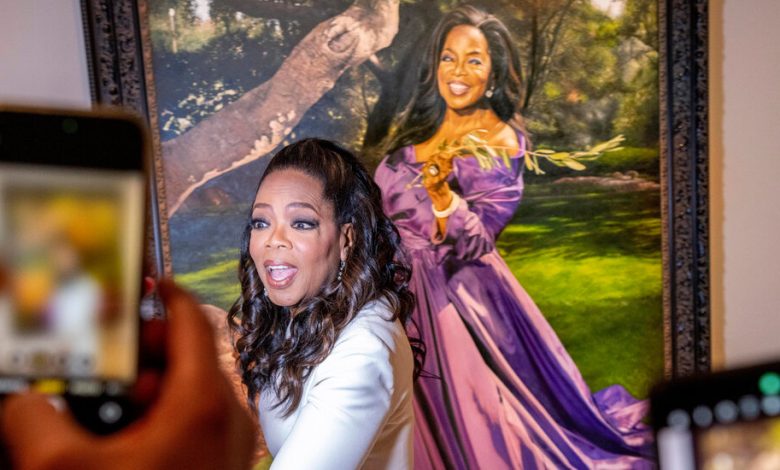Oprah Proves Diet Culture Spares No One

I can’t tell you where I put my car keys or what I had for breakfast three days ago, but I can tell you Oprah Winfrey’s goal weight.
My current Apple password and most of my elementary school teachers’ names have been lost to the mists of time. But I can tell you how much Ms. Winfrey weighed at her heaviest and how many pounds of fat were in the wagon she schlepped across the stage, post-Optifast, in 1988. I can also tell you how my own weight compared with hers at any given moment of my adult life.
By now, you’ve probably heard the news that Ms. Winfrey is thin, again. You’ve seen pictures of the mogul/producer/talk show host/author/worldwide icon, in a purple gown, on the purple carpet for the freshly remade film version of “The Color Purple,” which she co-produced. Maybe you’ve read the People magazine story in which she talks — or comes clean, in magazine-speak — about using one of the new weight-loss drugs, which, along with drinking a gallon of water each day, counting Weight Watchers points and eating her last meal at 4 p.m., has gotten her within seven pounds of her goal weight.
“I had an awareness of [weight-loss] medications, but felt I had to prove I had the willpower to do it. I now no longer feel that way,” Ms. Winfrey told the magazine. “I have been blamed and shamed, and I blamed and shamed myself.”
I believe her.
I believe that Ms. Winfrey has suffered, in ways that I, as a larger woman, can understand and in ways that I, as a nonfamous white woman, cannot.
When I read Ms. Winfrey describing how weight “occupied five decades of space in my brain, yo-yoing and feeling like why can’t I just conquer this thing, believing willpower was my failing,” I nodded in recognition. Been there, felt that. And I can assure you, it is wretched when you’re considering your happy life full of love and accomplishment and all you can think is, “If only I weren’t so weak. If only I could only lose 20/40/60 pounds. Then I could be content.”
But I also believe that Ms. Winfrey was part of the problem, even as she sought to find a solution for herself — that she both suffered under diet culture and paid her suffering forward, profiting from the idea that all of us had to be thin and that all of us could be, if we just tried hard enough.
She pushed diet after diet in her magazine. “Weight! Take It Off, Keep It Off. Do It Right This Time,” read a typical cover. “3 Crash Diets Doctor Approved!”
She put before-and-after pictures of herself on the cover, setting a photograph of her skinny circa 2005 self, in a midriff-baring top, beside a shot of a heavier 2009 version, with a line lamenting, “How did I let this happen again?”
It went beyond using her platform to elevate Dr. Oz and Dr. Phil, this celebrity trainer, that celebrity chef. In 2015, Ms. Winfrey bought 6.4 million shares of Weight Watchers, worth $43.2 million, giving her a 10 percent stake in the company.
Ms. Winfrey made money when Weight Watchers preached the gospel of points and self-control. She will likely make money now that Weight Watchers has added medications to its arsenal, especially because her new-body reveal comes on the cusp of New Year’s resolution season.
I wonder if, someday, we will look back at this moment when, for a blink, people tried to push back against diet culture. When there was slightly better representation. A smidge more inclusion. When there were larger women, with bellies and stretch marks, in the Sports Illustrated swimsuit edition and Victoria’s Secret ads. When some of us tried to tell our daughters — because it’s women who still bear the overwhelming brunt of weight stigma — that our bodies are not a problem to be solved, that health and happiness, beauty and strength are not tied to a number on the scale.
When, instead of trying to change ourselves, we had a chance to change the world but then fell prey to a familiar siren song: here, at last, a solution that works (as long as you can find the medications and afford them and tolerate them and are prepared to keep taking them) and Ms. Winfrey, the world’s most famous dieter, thin at last, thanks in part to the magic of medication, just before her 70th birthday. Never mind that Virginia Sole-Smith, the author of “Fat Talk: Parenting in the Age of Diet Culture,” told me that what Ms. Winfrey describes as a “healthy lifestyle,” including eating the last meal of the day at 4pm, isn’t one Ms. Sole-Smith would want a young person to emulate. “If you’re a kid with soccer til 5pm, this is very dangerous. You need to go home and eat dinner,” Ms. Sole-Smith pointed out.
Ms. Winfrey’s body talk was part of a wide-ranging interview with People that included a discussion of how she wished to be remembered. She described a conversation with Maya Angelou in which she said she hoped her school for girls in South Africa would be what she was known for leaving behind. Ms. Angelou told her that she couldn’t predict her legacy. “Your legacy is never one thing. Your legacy is every life you’ve touched.”
Which includes all of us who’ve shared Ms. Winfrey’s despair and dieted in her footsteps.
I suspect that Ms. Winfrey’s legacy won’t be just the big things she built — the school she created, the girls she educated and the fortune she amassed. It won’t be just the movies she produced or the novelists she promoted or the politicians whose fortunes she boosted. It won’t be just her talk show or her magazine or her philanthropy, the firsts she’s achieved or the good she’s done.
It will also be the idea that every woman’s body is a battleground, that our appetites are to be mistrusted and subdued, that fat is an enemy to be combated with every weapon available, that the war is never over and that thinness is a woman’s true life’s work, just as it’s been so much of hers.
Jennifer Weiner is a novelist. Her most recent book is “The Breakaway.”
The Times is committed to publishing a diversity of letters to the editor. We’d like to hear what you think about this or any of our articles. Here are some tips. And here’s our email: [email protected].
Follow the New York Times Opinion section on Facebook, Instagram, TikTok, X and Threads.



